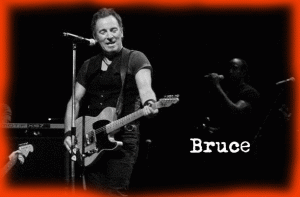THE BOSS @ 15,000
As a respite from the hard news of the day, two stories about artists—one musical, the other literary.
The first story may already be on your radar, which is the fact that, on Monday, the New Yorker posted David Remnick’s novella-length and revelatory profile of Bruce Springsteen. And, on the off chance you don’t want to immediately read the full 15,000 words in the New Yorker, you can read about Remnick’s portrait of The Boss—whom he succeeds in never referring to as “The Boss”—just about everywhere else (like Rolling Stone, New York Magazine, Fuse and the Washington Post, for starters.)
(As a happy Bruce cultist, I read the full 15,000 words Monday morning before coffee, and will likely read it again.)
“A HOLOGRAM FOR THE KING,” DAVE EGGERS’ POSTMILLENNIAL AMERICAN PARABLE
Dave Eggers is the guy who, when he was 30, published A Heartbreaking Work of Staggering Genius, his memoir about raising his kid brother after the death of both of his parents from cancer—a book that was shortlisted for a Pulitzer and was enough of a literary phenom that it made Eggers both famous and relatively rich. If you read the thing, it probably either enchanted you because of Eggers’ obvious, edge-walking talent, or irritated you because of the literary party tricks he employed—or a little of both.
In the dozen years since the publication of HWSG, Eggers has started a book publishing house, two magazines, a string of nonprofit writing and tutorial centers for kids, and has written a pile of books, both nonfiction and fiction, each one seeming to build on the other in terms of strength, grace and relevance.
And the party tricks are long gone.
Eggers latest book, A Hologram for the King, is both bracingly original and weirdly classic, a sort of “Death of a Salesman” for the global economy— and easily the best novel I’ve read thus far in 2012.
Hologram was also the book I’ve read of late that I felt the most mournful about finishing. I wanted to linger a bit longer in the characters’—and Eggers’—company.
That’s why it was so heartening to read the lengthy review of Eggers’ Hologram on the cover of Sunday’s New York Times Book section. Written by travel essayist and novelist, Pico Iyer, it hits every right mark in explaining why the book and the author matter.
Here are some clips from the review’s opening:
Where is our new-millennium Norman Mailer? It’s startling, 50 years on, to look back at the work of Mailer in the 1960s — from “The Presidential Papers” to “The Armies of the Night” — and see such unabashed ambition, such reckless audacity and such a stubborn American readiness to try to save the Republic from itself and bring it back to its original promise. Mailer’s very titles — “Advertisements for Myself,” “An American Dream” — told us he was on a mission, committed to the transformation of country and self, and even as he gave himself over to unremittingly private (and epic) meditations on God, the Devil, cancer and plastics, he was also determined to remake the civic order. He ran for mayor of New York City, he tried his hand at directing movies and in 1955 he helped start an alternative weekly known as The Village Voice. Part of the exhilaration of Mailer was that he cared so ravenously even when he failed; he was shooting for the moon even when he shot himself in the foot.
Dave Eggers comes from a much more sober, humbled, craft-loving time, and his latest novel is the opposite of a failure: it’s a clear, supremely readable parable of America in the global economy that is haunting, beautifully shaped and sad. But for all the difference between their generations, you can feel in Eggers some of the hunger, the range and the unembarrassedly serious engagement with America and its ideals that gave Mailer’s work such force.
[SNIP]Like Mailer, he’s almost underrated precisely because he’s so ubiquitous and dares us to mock him with his unapologetic ambitions. Yet where Mailer was consciously working in a deeply American grain, with his talk of revolution and transcendence, Eggers speaks for a new America that has to think globally and can’t be sure where the country fits on the planetary screen. And where Mailer was bent on showing us how America could remake the world, Eggers, with ferocious energy and versatility, has been studying how the world is remaking America. Most of our great contemporary examinations of cultural sampling and bipolar belonging come from writers with immigrant backgrounds. It’s invigorating, in that context, to see how Dave Eggers, born in Boston to classic fifth-generation Irish stock (his mother was a McSweeney) and raised in Lake Forest, Ill., has devoted himself to chronicling the shifting melting pot, seeming to tell others’ stories more than his own.
If you’re interested in literature, read the rest of the review. But if you’re just interested in a very, very good book that tells a quirky, dark-ish, funny, spare, discomforting and wildly insightful tale that will stay with you, read A Hologram for the King.
And if you want more Eggers after that, go down the list. (I particularly recommend Zeitoun.)
OKAY, NOW BACK TO OUR REGULARLY SCHEDULED PROGRAMMING.… which you’ll find in Taylor’s post below.
Photo of Springsteen by manu_gt 500, Wikimedia Commons
Photo of Dave Eggers by David Shankbone, Wikimedia Commons



What is Bruce Springsteen hiding by not releasing his tax returns?